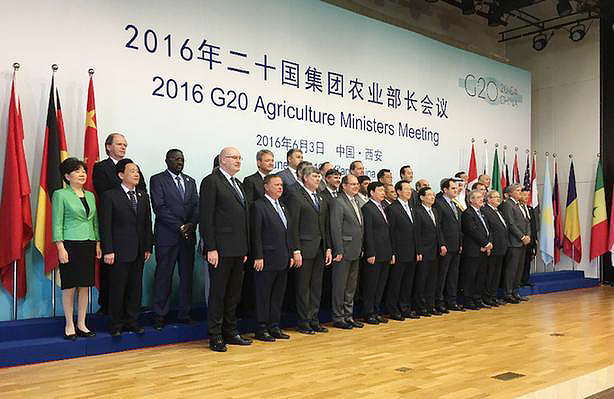China pushes to expand role of G20 in global governance

The 2016 G20 Agricultural Ministers Meeting, which concluded in Xi’an, capital of Shaanxi Province on June 3, prioritized innovation in global agriculture.
China’s presidency of the G20 will offer an opportunity to reflect on geopolitics and global governance while looking ahead to the future, said Bruce Jones, vice-president and director of the Foreign Policy program at the Brookings Institution in his recent article “China’s G-20 Presidency: Where Geopolitics Meets Global Governance.”
The 2016 G20 Summit to be held in Hangzhou in September under the theme of “Toward an Innovative, Invigorated, Interconnected, and Inclusive World Economy” is expected to play a more important role in promoting the development of China and the world.
China’s presidency of the G20 bridges the issues of global governance and major-power relations, Jones said. China has succeeded in breaking the logjam of stale and unproductive negotiations in climate change by striking an agreement with the United States. At a basic level, the G20 will set a tone for how major powers attempt to tackle the challenges that confront us all, he said.
“Many will place their hopes in the growth in China to keep the global economy moving forward, but to expect the Chinese economy to act as the single engine of world growth, while other G20 economies stagnate, is simply asking too much,” said Peter Williamson, honorary professor of international management at the Cambridge Judge Business School, University of Cambridge.
China has identified four key priorities for the 2016 summit of the G20 which Williamson suggests forecasts the focus and possible outcomes of this year’s G20.
Paving a new path for growth focuses on the need to find a way out of the problems associated with population aging. The Chinese focus is on advancing reform and innovation while creating and seizing new opportunities, Williamson said.
Under the banner of improved global economic and financial governance, the priority is to make the global system more resistant to shocks, Williamson said. It is hoped that better governance will be able to prevent another 2008-style financial crisis by increasing the representation and voice of emerging markets and developing countries, enabling them to better address the pressures they face, he said.
In terms of international trade and investment, the primary goal is to foster an open world economy that injects new vitality into global growth, Williamson said. China wants to ensure that the rise of nationalistic and protectionist sentiment across many countries in the G20 does not undermine global trade, he said.
The drive for inclusive and interconnected growth aligns with the 2030 Agenda for Sustainable Development adopted by the United Nations. China supports G20 initiatives that can encourage more infrastructure investment from multilateral development banks, which will drive industrialization in Africa and less-developed countries, Williamson said.
China is laying the groundwork for the 2016 summit to discuss these issues, and most of these topics will strike a chord within the G20 countries, Williamson said.
Zhao Qi and Wang Junmei are reporters at the Chinese Social Sciences Today.

 PRINT
PRINT CLOSE
CLOSE